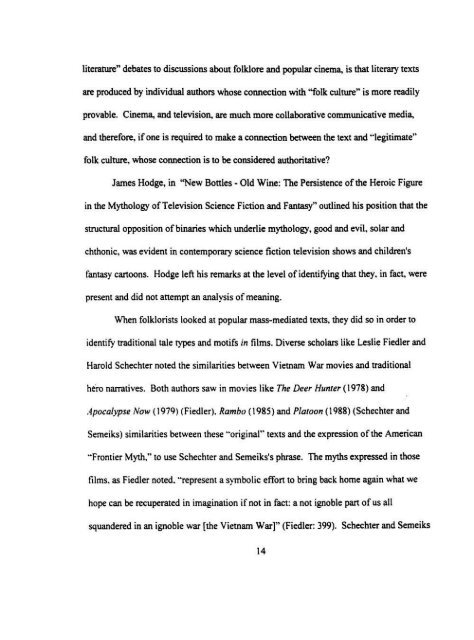Untitled - Memorial University of Newfoundland
Untitled - Memorial University of Newfoundland
Untitled - Memorial University of Newfoundland
You also want an ePaper? Increase the reach of your titles
YUMPU automatically turns print PDFs into web optimized ePapers that Google loves.
literatUre" debates to discussions about folklore and popular cinema, is that literary texts<br />
are produced by individual authors whose connection with "folk culture" is more readily<br />
provable. Cinema, and television, are much more collaborative communicative media,<br />
and therefore. ifone is required to make a connection between the text and "legitimate"<br />
folk culture. whose connection is to be considered authoritative'?<br />
James Hodge, in "New Bottles· Old Wine: The Persistence <strong>of</strong>the Heroic Figure<br />
in the Mythology <strong>of</strong>Television Science Fiction and Fantasy" outlined his position that the<br />
structural opposition <strong>of</strong>binaries which underlie mythology, good and evil. solar and<br />
chthonic. was evident in contemporary science fiction television shows and children's<br />
fantasy canoons. Hodge left his remarks at the level <strong>of</strong> identifying that they. in fact, were<br />
prescnt and did not anempt an analysis <strong>of</strong> meaning.<br />
When folklorists looked at popular mass·mediated texts, they did so in order to<br />
identify traditional tale types and motifs in films. Diverse scholars like Leslie Fiedler and<br />
Harold Schectller noted the similarities between Vietnam War movies and traditional<br />
hero narratives. Both authors saw in movies like The Deer Hunter (1978) and<br />
Apocalypse Now (1979) (Fiedler), Rambo (1985) and Pla/oon (1988) (Scheehter and<br />
Semeiks) similarities between these "origina'''lexts and the expression <strong>of</strong> the American<br />
"Frontier Myth," to use Scheehter and Semeiks's phrase. The myths expressed in those<br />
films. as Fiedler noted. "represent a symbolic effon to bring back. home again what we<br />
hope can be recuperated in imagination ifnot in fact: a not ignoble part <strong>of</strong> us all<br />
squandered in an ignoble war [the Vietnam War)'" (Fiedler: 399). Schechter and Semeiks<br />
14

















